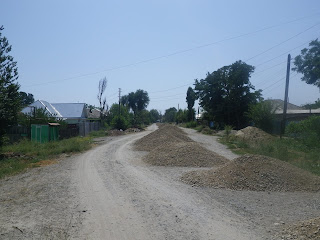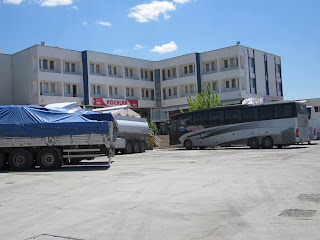WARNING: There are no pictures in this post, but check out the flickr page. I uploaded a few hundred in the past few days.
I've been in India for about 5 weeks now - the longest I've stayed in any one country by about 2 weeks. I feel like India is a worthy recipient of my extra time since it's just so big and diverse.
I've been in India for about 5 weeks now - the longest I've stayed in any one country by about 2 weeks. I feel like India is a worthy recipient of my extra time since it's just so big and diverse.
I can tell that staying here longer has done something to my personality, too. Actually, it's hard to say whether it's the five weeks in India or if it was the 6 months of travel leading up to India, but I feel sharper - more aware and much more aggressive here in India. You run into enough Pushkars and eventually, your body goes into the offensive to seek out and destroy (figuratively, of course) people who have no problem fleecing you down.
I partially learned this new-found aggressiveness from others. In the book I'm reading now, Shantaram, the narrator talks about how you can't really apply moral norms to India. People here do what is necessary to survive. Whether that means cursing, kicking, punching and gouging your way to a 3rd class seat on the train or apologizing profusely for accidentally tapping someone else's shoe on that same train once everyone is seated. (Those are his examples, not mine.) He argues that Indians switch back and forth between raw physical assault and saintly diplomacy in order to survive with their 1.2 billion other compatriots. You can see similar behaviors in China, but India is a little more intense, I think.
Another lesson I learned was from a friend of Rohit's - Raksha - who told me that you can't get anything done here without yelling at somebody. India is so full of clamoring voices and opinions that it takes a combination of volume and creative swearing to make things happen to your liking. It's not my style at all - I prefer to let the meaning and logic of my words speak for themselves, but that is a lost cause in India, so I've learned how to yell.
As I've gotten over my fear of confronting strangers in yelling matches, I've discovered that Indians take these confrontations surprisingly impersonally. As an American, I've been trained to take others' feelings into account and acknowledge that their emotions are just as important. Indians are much more egocentric because, I think, they can't afford to take other people's emotions into consideration. Sure, they are much more considerate with close friends and family, but not with strangers. I respect how well they can roll with the punches. I've seen so many situations here that would have turned into full-on brawls in the US but were resolved with just a bit of yelling, instead.
The trick, I think, is to learn how to be angry. I was never taught how to be angry. Instead, I've usually just let irritations fester until my emotions got the better of me and I explode. Basically, that's what has happened in India, too, it's just that those irritations mature into full fledged anger MUCH more quickly here than anywhere else I've been. So you learn to be proactive about it. Instead of waiting for the emotional anger to kick in, you generate it yourself once you see a situation going against your wishes. I've found that I have a little reserve of angry energy set aside in my brain for immediate use when a guard hassles me, or when someone insists on driving me after they've had 5 beers, or when a beggar starts reaching for your pocket, or when a rickshaw driver tries to rip me off. Instead of following my American instinct and giving the other person the benefit of the doubt, I shut it down immediately with a nasty look, a pointed finger and some choice words.
It's not like India is the only place that is like this. I remember everyone in the Balkans told me that they were the best at cursing because that's how they dealt with people. It's like that in the Caucasus, Central Asia and I'm sure lots of other places around the world. But I wasn't confronted with the necessity of doing it myself until I got to India. I suspect that the 6 months of travelling I did before India contributed to this, but India is also the most confrontational place that I think I've ever been. You won't get anywhere here if you don't learn how to say "no" and convince others that you mean it. I'm sure if I lived in the Balkans or Caucasus or wherever long enough, I would have picked up the same attitude eventually, but India really accelerates it.
It'll be interesting to see how long I retain that little pocket of reserve anger after I leave. I hope that I can keep it. Fighting with someone creates a bond that politeness never will. You haven't really measured yourself against someone and figured them out until you've confronted someone with a disagreement and resolved it. In America, people are much too eager to avoid confrontation, but I say bring it on.
The trick, I think, is to learn how to be angry. I was never taught how to be angry. Instead, I've usually just let irritations fester until my emotions got the better of me and I explode. Basically, that's what has happened in India, too, it's just that those irritations mature into full fledged anger MUCH more quickly here than anywhere else I've been. So you learn to be proactive about it. Instead of waiting for the emotional anger to kick in, you generate it yourself once you see a situation going against your wishes. I've found that I have a little reserve of angry energy set aside in my brain for immediate use when a guard hassles me, or when someone insists on driving me after they've had 5 beers, or when a beggar starts reaching for your pocket, or when a rickshaw driver tries to rip me off. Instead of following my American instinct and giving the other person the benefit of the doubt, I shut it down immediately with a nasty look, a pointed finger and some choice words.
It's not like India is the only place that is like this. I remember everyone in the Balkans told me that they were the best at cursing because that's how they dealt with people. It's like that in the Caucasus, Central Asia and I'm sure lots of other places around the world. But I wasn't confronted with the necessity of doing it myself until I got to India. I suspect that the 6 months of travelling I did before India contributed to this, but India is also the most confrontational place that I think I've ever been. You won't get anywhere here if you don't learn how to say "no" and convince others that you mean it. I'm sure if I lived in the Balkans or Caucasus or wherever long enough, I would have picked up the same attitude eventually, but India really accelerates it.
It'll be interesting to see how long I retain that little pocket of reserve anger after I leave. I hope that I can keep it. Fighting with someone creates a bond that politeness never will. You haven't really measured yourself against someone and figured them out until you've confronted someone with a disagreement and resolved it. In America, people are much too eager to avoid confrontation, but I say bring it on.























